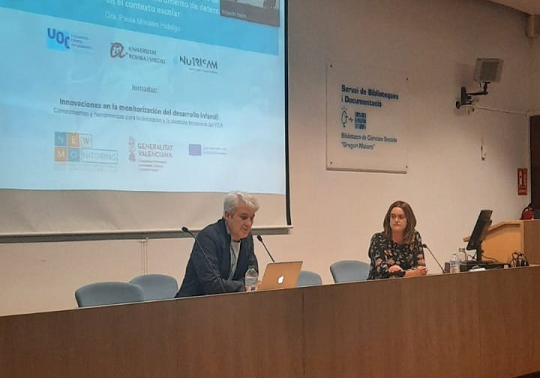
IRTIC has held the conference "Innovations in child development monitoring: knowledge and tools for early detection and care of ASD" with the collaboration of the CEFIRE of Inclusive Education of Valencia on 29 and 30 November at the Gregori Maians library of the University of Valencia. The activity, linked to the Erasmus+ NeMo project (New Monitoring Guidelines to Develop Innovative ECEC Teachers Curricula), of which the robotics institute is a partner, was aimed at teacher training students and brought together 135 people on the first day and 112 on the second day between on-site and online attendance.
The initiative aims to enable primary school teachers to acquire the knowledge and skills necessary to include children with ASD in classroom activities and to introduce and recommend these new training programmes to primary school teachers within the unified ISCED 0 (0-6 years) system, taking into account the needs of children with Autism Spectrum Disorder (ASD).
The project will also introduce and recommend monitoring tools and framework to create greater coherence in monitoring and prevention practices.
As for the people who intervened from Italy, Gabriele Giampieri, from the University of Bologna, gave a talk on "Interactions between children and caregivers, an observation methodology for early childhood teachers in Europe". Rita Ferrarese and Ilaria Farinella, from Gruppo Nazionale Nidi e Infanzia, focused on piloting the NeMO observation methodology in Italy and comparing the curricula of teachers in unitary and separate systems in Cyprus, Italy, Slovenia, Spain and Sweden, respectively.
Concerning Cyprus, Marianna Efstathiadou from the European University Cyprus described the organisation of early childhood education and care and monitoring systems in Cyprus, Italy, Slovenia, Spain and Sweden. Ourania Anastasiou, from the same centre, gave a literature review of the implementation of school readiness assessment in early childhood care and education systems in Europe.
From Spain, Paula Morales Hidalgo, from the Universitat Oberta de Catalunya, discussed the prevalence of ASD in the school population and student characteristics, as well as the development and implementation of an ASD screening tool in the school context. Gerardo Herrera, from IRTIC, listed the technological innovations in the detection, diagnosis and early care of ASD and Sonsoles Perpiñán, from the Junta de Castilla y León, made her presentation on the creation of competent environments in early childhood education.
The project's official website is https://nemo.adaptalab.org/, where videos of the talks can be accessed. It also has Twitter and Instagram.

 The European Commission's support for the creation of this publication does not constitute an endorsement of the contents, which reflect the views only of the authors, and the Commission cannot be held responsible for any use which may be made of the information contained therein.
The European Commission's support for the creation of this publication does not constitute an endorsement of the contents, which reflect the views only of the authors, and the Commission cannot be held responsible for any use which may be made of the information contained therein.











